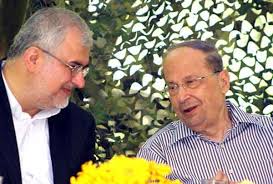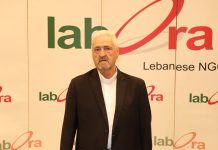Aoun’s lust for presidency cripples government
Hasan Lakkis & Ghinwa Obeid/The Daily Star/September 09/16
BEIRUT: The Free Patriotic Movement’s push to have founder MP Michel Aoun elected president has now crippled all state institutions. The party boycotted a second consecutive Cabinet meeting Thursday, prompting its allies to join in.
Just a few days after Speaker Nabih Berri suspended national dialogue sessions when tensions emerged with FPM leader Gebran Bassil, Prime Minister Tammam Salam has opted not to set a date for a new Cabinet session.
There is no indication that a solution to the political crisis will be easy, but according to ministerial sources Salam could follow in Berri’s footsteps by suspending Cabinet sessions in order to pressure political factions to compromise. The hope is that such a move could save the Cabinet, the only constitutional institution that remains active.
Salam will head to New York later this month to participate in the meeting of the United Nations General Assembly and is not expected to return before the end of September.
Asked by visitors whether Thursday’s boycott was meant to block the Cabinet’s work, Berri said: “It seems we have to get used to this for a long time.”
Berri said that the window for electing a president would last till the end of the year, after which the country would enter the parliamentary elections phase. He reiterated that the elections would not be postponed, indicating for the first time that the vote could pave the way for ending the political deadlock.
“Maybe by holding the [general] elections, we could reach a solution,” Berri said. “First by holding them, then electing the Parliament’s office and afterward electing a president. But all this requires prior agreement,” he said.
Thursday’s Cabinet meeting was boycotted by the FPM, Hezbollah, the Marada Movement and the Tashnag Party and attended by only 16 ministers, the exact number required for a quorum. The ministers did not make any decisions during the session.
During the meeting, Salam said the suspension of the national dialogue sessions had negatively affected the overall political atmosphere in the country, including that of the Cabinet, according to Information Minister Ramzi Joreige, who spoke to reporters afterwards.
“I have always warned of the policy of paralysis. I tried to unite the words, unify the vision and provide national immunity to preserve Lebanon amid the ongoing destructive events in our area, where there appear to be no solutions within reach,” Salam reportedly said.
“Today’s session is constitutional and in line with the National Charter, but we can’t not take into consideration the emerging political dimension, that we hope we can overcome, and move forward in bearing national responsibility at this tough stage.”
The prime minister said he would make space for deliberations and give ministers a chance to find solutions. But Salam also underscored that the Cabinet’s productivity is vital.
“We should not ignore the consequences of obstruction, and I hope that everyone knows that the absence of the government’s productivity raises a legitimate question over the point of its continuity.”
The FPM has expressed growing concern over the implementation of the National Charter, which enshrines equal power sharing between Muslims and Christians.
The party previously boycotted a Cabinet session on Aug. 25. Its decision was triggered by the issue of military appointments and the extension of a senior military official’s term.
The country’ political crisis has been deepening ever since Parliament failed to agree on a successor to former President Michel Sleiman. The absence of a president has put the Parliament’s work on hold.
With the country’s top Christian post vacant, Aoun has put himself forward as a presidential candidate. He is running against Marada Movement leader Sleiman Frangieh.
But lawmakers from Aoun’s bloc, Hezbollah’s bloc and some of their March 8 allies have boycotted parliamentary sessions to elect a president.
After the Cabinet session ended, Telecommunications Minister Boutros Harb said many ministers agreed with Salam’s directive to put off decisions and provide room for ministers discuss potential solutions.
Tourism Minister Michel Pharaon visited Aoun at his Rabieh residence following the meeting.
“Today there was a promise and commitment by Salam, who turned the session to one of discussion or dialogue, without delving into any item,” Pharaon said afterward.
Nevertheless, he said he thought that suspending Cabinet meetings was still the best option.
“I think that moving forward with the dialogue over the presidency will solve a lot of issues, but at the same time it’s important to protect the government in order to overcome the big crises,” he said. “It’s better to suspend the Cabinet session as we wait to find new solutions.”
Ministerial sources said Thursday’s Cabinet session was marked by compromise, with “no winners and no losers.”
They said those boycotting the session were pleased that their demand that no decisions be taken was acceded to. Those opposing the boycott were content that the session was held as scheduled.
But not all of those who were absent from the session objected to its being held. Some March 8 ministers said that their boycott wasn’t intended to be seen as being against the government or against Salam, but was instead undertaken to give room to discussions between different constituents, that they may find common ground and reactivate the Cabinet’s work.
“In order to give space to more discussions to find a solution for the current political crisis, I announce I will not participate in the Cabinet session. But I express my readiness to attend the first session that the prime minister calls for,” Culture Minister Raymond Areiji, who belongs to the Marada Movement, said before the meeting.
Although Hezbollah’s two Cabinet ministers had been expected to participate, neither attended the session.
Hezbollah Minister of State for Parliamentary Affairs Mohammad Fneish told the Central News Agency that their boycott was also to allow for solutions to be found for the ongoing the political crisis.
“We boycott the session in solidarity with our ally the FPM, whose position toward the National Charter cannot be ignored, but we should look into what it is affecting, and work to find solutions so that it doesn’t affect the overall situation in the country,” Fneish said.
“Our boycott today was to give a chance for solutions to be found, as it’s not acceptable for the current situation in the country [to deteriorate further] – especially after what happened in the national dialogue session – and head toward greater tension.”
In their weekly meeting, Hezbollah’s Loyalty to the Resistance bloc said that all dialogue sessions should resume, and that not continuing with such talks will only complicate the situation further.
The bloc also clarified its position regarding the Cabinet session, saying the “bloc is convinced of the importance of the government continuing its work,” but that its absence was intended to provide room for ongoing discussions to resolve the crisis.




















